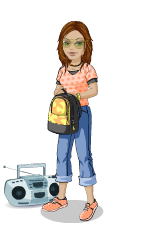Heeeere's Linda...and Feenberg, and Barney, and Levy
This week we're moving into the notions of collective intelligence, democracy, and electronic writing. This is going to be challenging material, and I know Linda's going to give it her best to motivate us toward working through these writers.
We'll do a lot of work in class tomorrow night. Until then, Linda, take it away!
Diane
We'll do a lot of work in class tomorrow night. Until then, Linda, take it away!
Diane


2 Comments:
1) We are seeing small and large shifts in power now and will continue to see these changes in the future. I think you will see a continuous back and forth as new technology emerges. When something new comes along, “the people” will usually have the power. As discussed in class, employees can fire off e-mail complaints and get quick responses. But as time goes on, companies gain more understanding and control. Now they have much better ways to monitor the productivity of their employees. In that case, they have the power again. But eventually something new comes along and the cycle repeats.
One example is the internet music piracy battle. When this new internet technology arrived, people wanted fast downloads and to have access to a more flexible selection. Music companies refused to partake but the people wanted it. The technology was there and the people exploited it. They took the power. But now, music companies are taking advantage of the tech by selling music and also using it to go after the distributors. Now the power is shifting back to their side. The movie industry is just now beginning to face that dilemma.
2) It depends on the individual. Like anything else, these things can be exploited to positive results or can be abused. When we’re teenagers, we’re often trying to find our identities. Many people experiment with different ideas and personas. These environments can sometimes help people to express themselves in a relatively safe way. On the other hand, some may become too immersed into their internet personas. They might avoid contact with the real world. Younger people might not develop the social skills they need in the real world. Some might use the relative anonymity to hurt others. I think these communities can complicate the line between the real world and make believe. As with everything, though, it depends on the user.
3) I think things will balance out as time goes on. Yes, many of the lower end jobs will either be outsourced or replaced by computers and automation. But with technology also comes entirely new jobs. People have always lost jobs due to new technology and society manages to survive. It’s always unfortunate and I’m sure somewhat degrading to lose your job to a machine or computer program, but new opportunities will present themselves. (hopefully)
But I think there is a line that needs to be drawn somewhere. Allison’s story of her sister is a good example. There has to be a balance struck, not just so we have ample job opportunities (though that’s certainly very important) but because technology can’t yet replicate human interaction that well. Certainly in a hospital, that component is vital.
4) This is an incredibly hard question for some reason. I’m just having a hard time imagining what a new political structure for technology would even look like. Not to mention the fact that we really can’t imagine what type of technologies we’ll have in the future. How do you strike a balance between safety and freedom? How much do you take from one category to strengthen another? For everyone, that line is different. Someone in class mentioned there being no monopolies and a free flow of information. To me, security is vital. Spam and spy ware would be made illegal. Wireless access for everyone is a good start. For general things, I would extent real world laws into the internet world as much as possible.
5) As discussed in class, pop culture is our main cultivator now. It will continue to be so for the foreseeable future. Who or what will be obsolete in the future? That’s hard to say. It’s hard to predict how the world’s tastes and experiences will shift and alter 10 years from now let alone 100 years or more. Will we become so physically connected to technology that we’ll lose individuality and truly come together as a collective or will we draw a line somewhere and say that’s enough? But in my life time, I don’t see pop culture’s stranglehold on our personalities going away. I think it will only grasp tighter and tighter.
1. The powershifts are evident as per the discussion we had; unlike real-life wisdom and experience, technological know-how is not a luxury of the elder but of the quick learner. As I know more about computers then my father, so shall many children know more then me (soon).
As far as a decentrilization of power (workers in companies) and the crafty unknown menace (online stalkers), I think online communities have but enhanced a current trend/problem. One could see the victims as the ones always not on the offensive.
2. I was never a fan of the concept of a serious avatar or of a secret life online. This concept, while supposedly an outlet for some, seems unhealthy in all aspects when it becomes a second life. It seems fantasy takes over and people no longer live in a realm of normality and logic, but in a land of Disney wishes that can never come true.
3. As Shawna commented, technology is very convenient and efficient but often takes the salary of a working person. Granted we can't halt development so everyone can have a job, but it's amazing that even in jobs of specialty and of required education, machines and technology advance forward and remove the need for that job.
2.
Post a Comment
<< Home